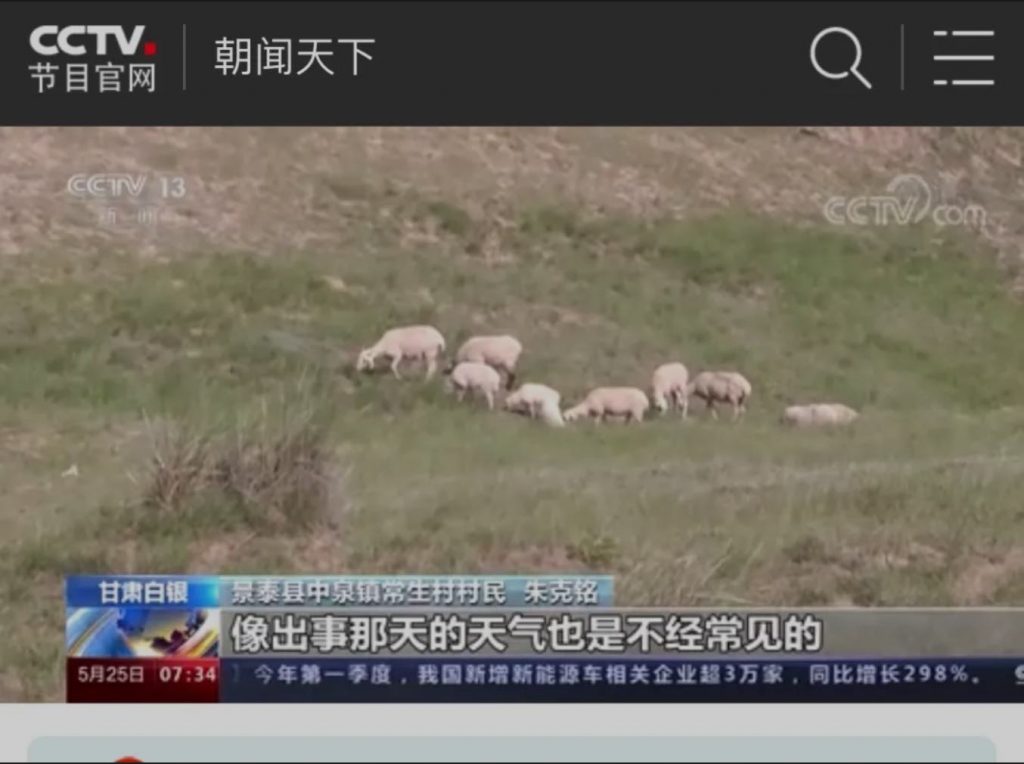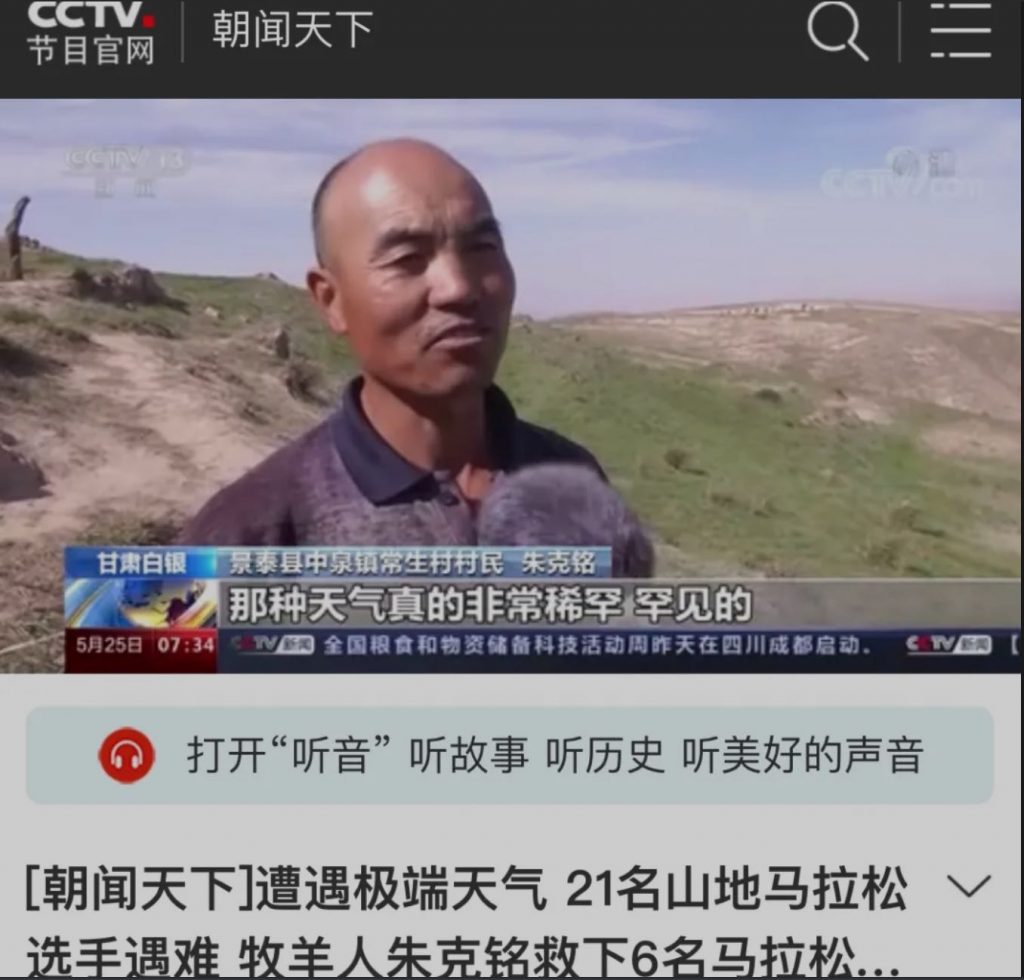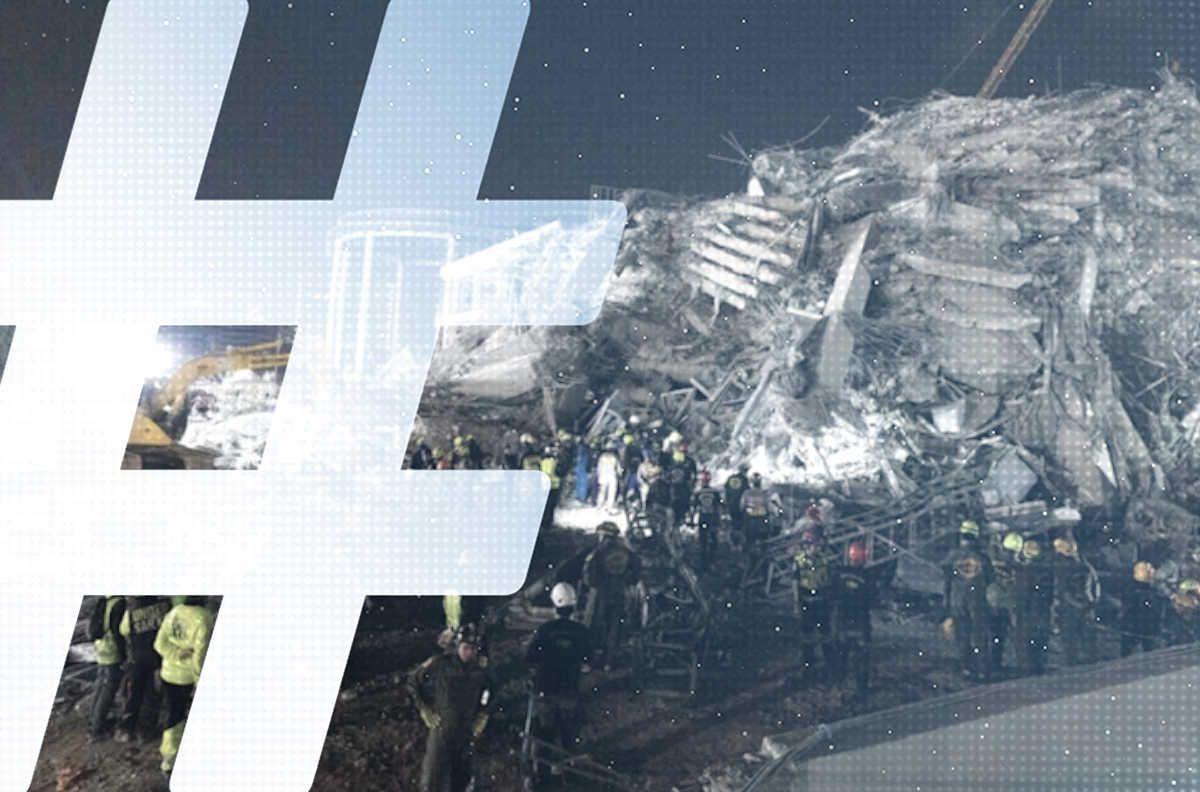Tracking Control
Unnatural Causes
Officials in China announced yesterday that an investigation is now underway into the death of 21 runners over the weekend as they took part in a 62-mile race across rugged terrain in the northwest province of Gansu, amid freezing temperatures and inclement weather. Accounts repeated across Chinese media in the past two days have suggested that freak weather was the cause of the tragedy – an explanation that has been reinforced in some international media reporting of the story.
In the wake of disasters of this kind in China, discussion often centers on two words. On the one hand, there is the “natural disaster,” or tianzai (天灾), the act of God, suggesting that outcomes were beyond human control. On the other hand, there is the “human disaster,” or renhuo (人祸), the tragedy in which human negligence and perhaps corruption are major contributing factors. Historically, in the event of tragedy, the authorities and state media tend to lay the emphasis on natural, inescapable factors, thereby throwing off any hint of government responsibility.
A report on the tragedy in Gansu from the official Xinhua News Agency, posted on Sunday, poses the question directly: “Was this a natural disaster or a human tragedy?” It goes on to discuss various aspects of safety and preparation. Quoted at the end of the story, sports official Li Shengxin (李圣鑫) mentions the importance of safety preparation and concludes that the inability of rescue teams to reach competitors quickly in this case was an important reason for the serious loss of life. This seems to place the Gansu tragedy somewhere on the scale between the tianzai and the renhuo. Perhaps not enough was done to prepare for freak weather.
But in an article posted to WeChat today, Chu Chaoxin (褚朝新), a former journalist for Southern Weekly and The Beijing News, takes issue with the entire premise that unusual weather patterns were a primary factor behind the Gansu tragedy. He cites as evidence the inconsistencies in reporting in the Chinese media of the account given by a single source, the local herder who managed to save the lives of six athletes participating in the event.
Chu’s doubts about the official narrative on the marathon tragedy, which is now tending toward the emphasis on natural factors exacerbated by poor preparation, center on a very basic question – is dangerous weather in this area of Gansu extraordinary, or in fact quite ordinary?
Our translation of Chu’s WeChat post follows:
“Why Would the Herder Who Saved Six People Openly Lie?”
I’ve managed all along not to say anything, but finally I feel I must say something – seeing as so many people have died. The reason I’ve said nothing these past few days is that I had no idea what to say. I am really very, very at a loss as to how 21 people can die just running a marathon.
But as information has proliferated [in this case] I’ve come to notice something really strange, and I feel it should be said.
At around 9AM on May 22, the Fourth Huanghe Shilin Mountain Marathon kicked off in Jingtai County, Baiyin City, Gansu. Officials in Baiyin have disclosed that the event was sponsored by the Baiyin Municipal Party Committee and Municipal Government, and hosted by the Baiyin Sports Bureau, Jingtai County Party Committee and Jingtai County Government, with Shengjing Sports and Culture Development (晟景体育文化发展有限公司) responsible for running the event.
It is truly unbelievable that it was at such a tournament, sponsored by the municipal government and hosted by the municipal sports bureau and the county government, that 21 people died.
Some have said that extreme weather was encountered and that was a disaster of natural causes. Other participants have said that this event, the fourth of its kind, was actually better organized than the previous three, making it seem even more a natural event.
Then there is the sheep herder who managed to rescue six runners and has received extensive media attention. In a report in The Beijing News on May 24 called, “The Shepherd Who Rescued Six Cross-Country Runners”(这名牧羊人,连救六名山地越野赛选手), the shepherd was revealed as saying that the weather that day was really bad, that there was rain and hail and that even cotton jackets did not suffice – that it was still really cold.
But then he told the reporter from The Beijing News that “this kind of bad weather is quite common.”

If this sort of bad weather is quite common, then the fact that this time people have died suggests that this area is really not suited to this kind of long-distance race. The fact that no one died during any of the first three events can only be regarded as extremely lucky. To run this kind long-distance wilderness race in a place where this kind of inclement weather occurs frequently is really tempting fate, and to have people die was simply a question of when.
If this sort of bad weather is quite common, then why did the hosts wish to have this sort of competition? Was it because they didn’t realize that people might die, or because they underestimated just how lethal inclement weather in the area could be? Whatever the reason, so long as we can determine that this sort of weather is common in the area, then we can say that the tragic death of these 21 people is a man-made disaster (人祸) rather than a natural disaster.
This morning the May 25 edition of China Central Television’s “Morning News” (朝闻天下) also reported that it had interviewed the herder. This time, however, the herder’s statement had changed. This time he was quoted as saying: “Weather like that on the day of the accident is something we don’t see very often.” And, “Weather of this kind is truly very rare, very rare.”


So did the reporter from The Beijing News get this wrong?
When I went online to search for myself, I found that in separate interviews with other media on both the 23rd and the 24th, the herder said that this sort of weather is quite common. When he was interviewed by Xi’an Business (西安商报), for example, that is what he said, and there is video to support this.


It seems then that The Beijing News was not wrong in its reporting, but the herder who saved these six competitors has changed his statement. Why would he change his story?
Media have reported the herder as saying that he felt saving lives was just a casual act, and a big deal has been made of this online — that he feels this is something very common, something one should just do. Why would a simple herder so openly alter his statement and lie? Why would a good and kind shepherd offer the media two completely opposed versions of the same story?
With this kind of contradictory statement, there is most definitely someone at work behind the scenes, and he was most definitely asked to change his story. Someone is trying to transform a human disaster into a natural disaster.
Several surviving runners have reported that in one section of the course it was impossible even for motorcycles to get through. At the third checkpoint in the race, no supplies were available at all, to say nothing of preparation for rescue. This detail further suggests that the organizers of the race lacked sufficient scientific knowledge of the wilderness course. They did not even anticipate bad weather and made no preparations for rescue.
This was not a sports competition organized by the local Party and government — it was simply a real test of wilderness survival in which no allowances whatsoever were made for rescue. What is heartbreaking is that 21 challengers died in this real version of wilderness survival.
Some people have spoken out online accusing the participants of being ill-prepared, while others have accused the players of risking their lives for prize money. Comrades, gentlemen, this was a competition organized by the municipal government of a prefectural-level city, and hosted by the municipal sports bureau and the local county government. Even if the players were not adequately prepared, there was no reason whatsoever that the participants should die.
To say that this accident that killed 21 people was an act of God is stupid if not malicious. For so many people to die competing in a marathon, no-one, not the hosts and not the organizers, can be exempted from responsibility. There is no way this matter can be put to rest with a simple apology from one mayor.





















